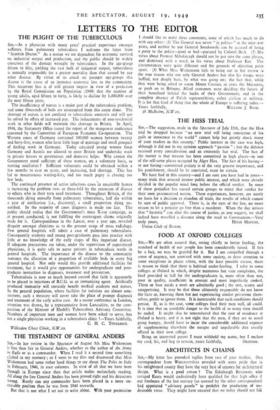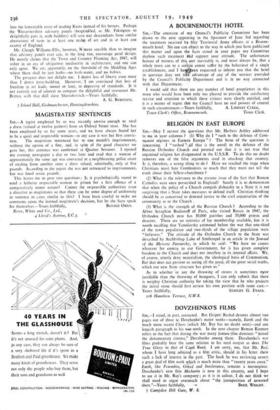ARCHITECTS IN CHAINS
SIR,—My letter has provoked replies from two of your readers. One correspondent from Worcestershire revealed with some pride that in his enlightened county they have the very best of censors for architectural design. What is a good censor ? The Edinburgh Reviewers who savaged Keats would undoubtedly have qualified for that high office if our forebears of the last century (so scorned by the other correspondent) had appointed "advisory panels" to prohibit the production of un- desirable verse. They might have ensured that we today should not fall
into the lamentable error of reading Keats instead of his betters. Perhaps the Worcestershire advisory panels (besprinkkd, as Mr. Pakington so delightfully puts it, with builders) will save our descendants from similar aberrations of taste in at least one realer of art and in at least one county of England.
Mr. Clough Williams-Ellis, however, limore sensible than to imagine that advisory panels ever can, in the long run, encourage good design. He merely claims that the Town and Country Planning Act, 1947, will usher in an era of ubiquitous mediocrity in architecture, and one can only agree. We are, apparently, on the threshold of the Middling Ages where there shall be just baths—no bath-water, and no babies.
The prospect does not delight me. I detest loss of liberty even more than I detest jerry-building. Moreover,' I am convinced that loss of freedom in art leads, sooner or later, to depravity of standards. It is not entirely out of context to compare the delightful and irreverent Mr. Britten with that dull slave Shostakovitch.—Yours faithfully,
7 Island Hall, Godmanchester, Huntingdonshire. A. G. ROBINSON.



































 Previous page
Previous page